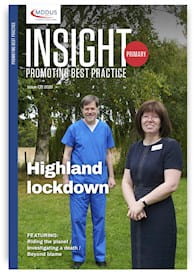TWITTER is fascinating in its preoccupations. There are regularly lively discussions about hierarchy, in healthcare and beyond. The themes recur. Some might concern a colleague who is described as unwilling to engage with those at an early stage of training. Others recount the ways in which the most senior colleagues appear not to accept their responsibilities towards those who depend on them.
Sometimes, the implicit assumptions and perceptions of an unspoken hierarchy interact with professional affiliations. On other occasions, the apparent intersection between hierarchy and clinical specialty reminds me of Simon Sinclair’s anthropological study from the 1990s – Making Doctors: An Institutional Apprentice. In his book, Sinclair describes how different specialties are represented to and perceived by medical students, and I had hoped his findings were no longer evident in contemporary education, training and practice. Hierarchy though remains central to how healthcare is structured and practised. Whether hierarchy is explicit or implicit, ethical questions and considerations arise.
The ethical challenges of hierarchy are considerable at individual, organisational and systemic levels. Hierarchy reflects and reinforces that a relationship may be imbalanced in terms of power and agency. It creates a structure within which asking questions and challenging practice may be perceived as risky or even described as ‘inappropriate’.
Much excellent work has been done on encouraging anyone to speak up, ask questions and, if necessary, express their concerns in a free and secure environment. Nonetheless, it is people as much as structures that contribute to the culture of an organisation or team. The stakes are considerable. There remain reports of marginalisation, criticism and professional consequences for those who have questioned or challenged practice. Those reports come from those at all stages of their careers; hierarchy is ever present even when one becomes ‘senior’.
The influence of people on a team, practice or organisational culture means that there is, of course, scope to respond to the ethical implications of hierarchy in a deliberate and considered way. Two authors who have influenced my own thinking about ethical practice and hierarchies are Amy Edmonson and Mary Gentile. The former writes about psychological safety and her book The Fearless Organisation is excellent. The latter developed a programme called ‘Giving Voice to Values’ based on her book of the same name. Neither specialises in healthcare, but their ideas and work resonate when thinking about clinical settings. I recommend both books to readers; it would be unwise and a disservice to attempt to summarise complex ideas in a short column. Although the language of psychological safety and giving voice to values may (arguably) sound ‘soft’ on first encounter, there is nothing soft about the work involved nor the potential impact on people and care.
Psychological safety is about creating the circumstances to have the conversations that are hardest: those that acknowledge and don’t diminish or dismiss discomfort, disagreement and difference. It is not about a superficial sense of ‘wellbeing’ or a contrived metric for satisfaction. It involves admitting difficulty, engaging with unwelcome or opposing perspectives, ensuring fairness that is attentive to individuals and always being alert to the tensions created by hierarchy and power.
Giving Voice to Values is a skills-based approach to enacting values in work settings (or elsewhere) that is practical. Indeed, it depends on practise (as a verb). It makes values overt and encourages participants not to be afraid of, or apprehensive about, differences of values. It locates values-based questions and conversations in the context of choices that we have all made at other times in our lives. It is outcome-focused and emphasises the difference that we can make when we give meaning to values.
This is not comparable to the ease with which some, although by no means all, organisations develop ‘values’ and then refer to them solely as a communications tool rather than something that is grounded in their norms and expectations. Nor is Gentile interested in a theoretical discussion of values which has little resonance for frontline professionals in demanding work environments. This is not quick. As someone who has practised and facilitated the Giving Voice to Values approach for a long time, it is always a work in progress and that progress is not linear. However, it is, for me, worthwhile and can be transformative in the most challenging of situations or testing of conversations.
There are other interventions too that acknowledge and provide an ethical response to hierarchy, many of which are simple but effective. These include amplifying the achievements of those earlier in their careers, modelling openness about uncertainty, doubt and complexity, taking responsibility for misjudgements and errors, apologising readily and giving honest, specific and timely feedback with an emphasis on development.
Readers will have other examples, many of which are probably unplanned. Never underestimate your ethical impact, wherever you are in the hierarchy.
Deborah Bowman is professor of Bioethics, Clinical Ethics and Medical Law at St George’s, University of London
This page was correct at the time of publication. Any guidance is intended as general guidance for members only. If you are a member and need specific advice relating to your own circumstances, please contact one of our advisers.
Read more from this issue of Insight Primary

Save this article
Save this article to a list of favourite articles which members can access in their account.
Save to library

